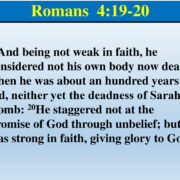In giving a prophetic word, it is most important for the receiver to understand the prophecy. There is no need to use Old English, as it was used in the King James Bible. You can speak in plain and simple English. As in any communication process, getting the message across is the priority—not simply appearing spiritual or eloquent.
The demeanor of the one speaking the prophetic word must match that of the Holy Spirit. In other words, the prophet must be humble, compassionate, and must move with wisdom. Also related to this point, the prophet must be sensitive to the movement of the Holy Spirit. If the Holy Spirit is causing the prophet to flow or to stop, then the prophet must submit to the guidance of God.
Like what Paul said in 1 Corinthians 13, if you prophesy without love, you are just making senseless noise. Love must be at the center of everything we are doing. Our motive in prophesying must be to bring out the best in people, and to lead them to Jesus. If you are prophesying for any other reason, then you must stop prophesying.
In the church service, the appropriate way is to submit to the person in-charge. Even if you feel you can still prophesy more, but the lead pastor said it was time for prayer already, then you submit to his authority. Always be humble. Moreover, be teachable. If the lead prophet pulls you aside to tell you that you can do better, listen to Godly counsel.
When we prophesy, we say, “thus saith the Lord.” There is no part in this statement that says we are to judge. Even if we see a prophetic picture of the sins of a person, we must not judge them, because we are well-aware that no one is righteous, and no one can save himself. We are all dependent on the glory of Jesus. The prophetic word we are giving is to help this person live in the freedom that Jesus won for them. We are just the messenger.
In giving a prophetic word, it is most important for the receiver to understand the prophecy. There is no need to use Old English, as it was used in the King James Bible. You can speak in plain and simple English. As in any communication process, getting the message across is the priority—not simply appearing spiritual or eloquent. The demeanor of the one speaking the prophetic word must match that of the Holy Spirit. In other words, the prophet must be humble, compassionate, and must move with wisdom. Also related to this point, the prophet must be sensitive to the movement of the Holy Spirit. If the Holy Spirit is causing the prophet to flow or to stop, then the prophet must submit to the guidance of God.
Like what Paul said in 1 Corinthians 13, if you prophesy without love, you are just making senseless noise. Love must be at the center of everything we are doing. Our motive in prophesying must be to bring out the best in people, and to lead them to Jesus. If you are prophesying for any other reason, then you must stop prophesying.
In the church service, the appropriate way is to submit to the person in-charge. Even if you feel you can still prophesy more, but the lead pastor said it was time for prayer already, then you submit to his authority. Always be humble. Moreover, be teachable. If the lead prophet pulls you aside to tell you that you can do better, listen to Godly counsel.
When we prophesy, we say, “thus saith the Lord.” There is no part in this statement that says we are to judge. Even if we see a prophetic picture of the sins of a person, we must not judge them, because we are well-aware that no one is righteous, and no one can save himself. We are all dependent on the glory of Jesus. The prophetic word we are giving is to help this person live in the freedom that Jesus won for them. We are just the messenger.
Your weekly dose of prophetic wisdom and anointing awaits you. Join our LIVE Conference Call!
1) Call 515-604-9266
2) Go to startmeeting.com, and use the login: BishopJordan
Give five practical things you have learned about giving prophecy that you consciously apply or consider when giving a prophetic word.














